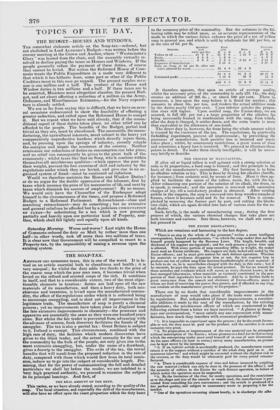TOPICS OF THE DAY.
THE BUDGET—HOUSES AND WINDOWS.
THE somewhat elaborate article on the Soap-tax—reduced, but not abolished in Lord ALTHORP'S Budget—was written before the stormy meeting at the Crown and Anchor, where " Westm:nster's Glory " was hooted from the chair, and the assembly virtually re- solved to decline paying the taxes on Houses and Windows. If the people generally refuse the payment of these duties, of course they cannot be levied. But unless the Reformed House of Com- mons treats the Public Expenditure in a mode very different to that which it has hitherto done, some part or other of the Public Creditors must in this case go unpaid. The present surplus reve- nue is one million and a half. The produce of the House and Window duties is two millions and a half. If these taxes are to be remitted, Ministers must altogether abandon the present Bud- get, and set about effecting a reduction of a million on the Army, Ordnance, and Miscellaneous Estimates,—for the Navy expendi- ture is already settled. THE somewhat elaborate article on the Soap-tax—reduced, but not abolished in Lord ALTHORP'S Budget—was written before the stormy meeting at the Crown and Anchor, where " Westm:nster's Glory " was hooted from the chair, and the assembly virtually re- solved to decline paying the taxes on Houses and Windows. If the people generally refuse the payment of these duties, of course they cannot be levied. But unless the Reformed House of Com- mons treats the Public Expenditure in a mode very different to that which it has hitherto done, some part or other of the Public Creditors must in this case go unpaid. The present surplus reve- nue is one million and a half. The produce of the House and Window duties is two millions and a half. If these taxes are to be remitted, Ministers must altogether abandon the present Bud- get, and set about effecting a reduction of a million on the Army, Ordnance, and Miscellaneous Estimates,—for the Navy expendi- ture is already settled. We are so far from saying this is difficult, that we have on seve- ral occasions endeavoured to show the feasibility of effecting a greater reduction, and called upon the Reformed House to compel it. But we repeat what we have said already, that if the uncon- ditional repeal of these duties takes place, no other relief can be afforded to the people. The benefits of the Budget, partial and trivial as they are, must be abandoned. The mercantile, the mann- . facturing, the agricultural interests, must submit to the heavy yet comparatively unproductive burdens which directly injure them, and, by pressing upon the springs of industry, secretly cripple the energies and impair the resources of the country. Neither remissions nor reductions of duties on consumption can take place, and no relief can consequently be given to the great bulk of the community ; whilst taxes like that on Soap, whieh combine within themselves all mischievous qualities—which oppress the poor by their weight, prevent the free exercise of skill and industry by the regulations under which they are levied, and give rise to an or- ganized system of fraud—must be continued ad infinitum. Would we therefore maintain the House and Window Duties? or do we argue for the double oppression of the labourer, first by taxes which increase the price of his necessaries of life, and next by taxes which diminish his sources of employment? By no means. We would only have the Chancellor of the Exchequer adapt himself to the circumstances of the times, and propose a Reformed Budget to a Reformed Parliament. fletrenchment—close and searching retrenchment—may do something ; but no extensive and general reliefcan be afforded but by a judicious COMMUTATION OF TAXES—by substituting for a tax which is now pressing partially and heavily upon one particular kind of Property, ano- ther, which shall fall lightly and equally upon all kinds.






















 Previous page
Previous page